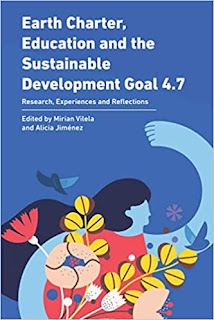Earth Charter, Education and the Sustainable Development Goal 4.7: Research, Experiences and Reflections
A new book is out Earth Charter, Education and the Sustainable Development Goal 4.7: Research, Experiences and Reflections edited by Mirian Vilela and Alice Jimenez,
The EC is an ethical foundation for actions to build a more just, sustainable, and peaceful global society in the 21st century. It articulates a mindset of global interdependence and shared responsibility. It offers a vision of hope and a call to action.
The Earth Charter document starts with the Preamble, followed by the four pillars: Respect and Care for the Community of Life, Ecological Integrity, Social and Economic Justice, and Democracy, Nonviolence, and Peace. It concludes with The Way Forward.
The present book seeks to contribute with current global efforts, most of them framed as part of the United Nations 2030 Agenda, for a revolution in the education practice (or for a new paradigm of education to emerge) to address the unsustainability challenges humanity is facing.
The book compiles 25 chapters from 29 authors, representing 11 countries, in which the authors reflect on how education policies, processes and practices would primarily seek to cultivate a new level of ecological responsibility, as well as sustainability and global citizenship consciousness.
The chapters provide insights of the type of education practice that seeks to address the disconnect between acquiring knowledge and the commitment to contribute with the common good and the well-being of all.
The content presented in this book correspond to some of the presentations offered at the Earth Charter International Education Conference: Leading the Way to Sustainability 2030. The conference was organized by the Earth Charter Center for Education for Sustainable Development at the University for Peace and took place on 29 - 31 January 2019





Comments
Post a Comment